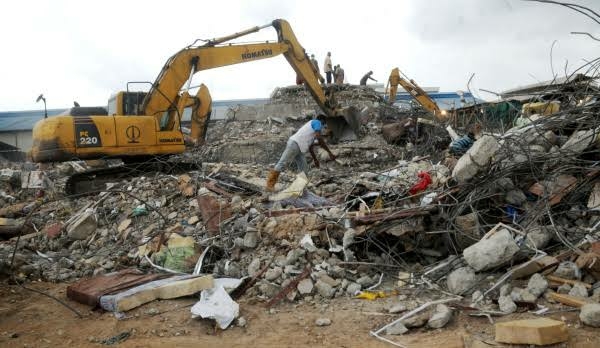The experts made the remarks at the second annual stakeholders conference, organised by the Lagos State Materials Testing Laboratory (LSMTL) on Thursday in Lagos.
The theme of the conference was: “The Socio-Economic Impact of Building and Civil Engineering Infrastructure Collapse, in Mega Cities.”
They called for more accountability on the part of regulatory agencies, as well as adequate information to help the public make building right a culture in the state.
In his keynote address, Prof. Ayo Omotayo, Director General, National Institute for Policy and Strategic Studies, Kuru, stated that the demand for houses, outstripped the supply, hence several issues were leading to several cases of building collapse.
Omotayo, a professor of Environmental Sustainability, further noted that the state government could not handle such issues alone, except with the participation of the private sector, which must also be accurately regulated.
He advised the government to make adequate information available to the public and end-users of houses, for them to insist on quality delivery from developers and other players in the construction value chain.
The don also offered to assist the state government in the area of research, to better understand the soil and other environmental factors toward making the right decisions, on quality of materials and standards.
He noted that such measures would help to curb building collapse.
“We do not have enough information at this point to stop building collapse,” he said.
He called for a census of old buildings in the state and their ages, to be able to adopt measures against collapses.
On his part, Prof. Anthony Kila, an expert, urged the state government to reward compliance to encourage more people to embrace safe construction, as a culture.
“There has to be an incentive for those who comply,” he said.
Kila called for more sensitisation of the public with adequate platforms for feedback, adding that, there was the need for regulatory agencies to adopt user-friendly options.
He urged regulatory agencies to sometimes visit some construction sites, to offer advice to attract goodwill of residents toward voluntary compliance, rather than always pursuing sanctions.
Kila noted that building collapse was a sign of failure of society, adding that regulators must understand that those who cut corners were trying to reduce cost, hence, the need for more material testing laboratories for easier accessibility.
Dr Phillips Fagbohun another geographer and urban planner, in his presentation, said right responses to human and environmental factors were the antidotes needed to forestall the menace.
Fagbohun said calamities from environmental factors could be averted by adherence to construction standards and building regulations, to ensure building of livable cities.
He noted that Lagos was overpopulated and had more than 10,000 residents per square kilometer.
He said building collapses in Nigeria and Lagos were causing more deaths than diseases, in addition to huge loss of investment and revenue.
Mr Olufunsho Elulade, General Manager, Lagos State Materials Testing Laboratory (LSMTL), said materials testing compliance had doubled the previous records, since its maiden 2021 stakeholders conference.
Elulade stated that the agency had testing laboratories in all Local Government Areas (LGAs) carrying out soil testing and evaluation, concrete, steel, chemical, calibration, non destructive tests and geotechnics analysis.
Other speakers at the event included property lawyers and developers, who shared insights and solutions to building collapse, to avert economic losses, safeguard health and well-being of residents.

















Discussion about this post